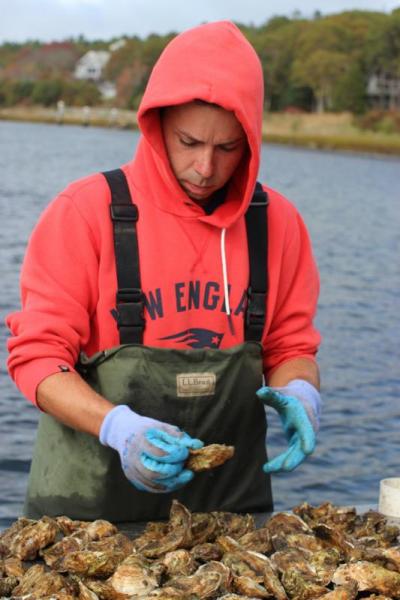Department of Agriculture shells out two grants to local oyster farmer
The people at Indian Point Aquaculture are in the homestretch of another successful season of raising and selling oysters, and some outside sources have helped to make sure that run continues.
Located in a small, sheltered body of water called Bourne Cove off of Indian Neck Road, the current business has been raising and selling oysters since the late 1990s. Co-owners Mike Besse and John Nelson lease two “grants” from the town of Wareham in order to use 12 acres of the cove’s waters, which connect to the nearby Buzzards Bay and Atlantic Ocean.
Recently, the business received a different type of grant, though, or two for that matter.
In early October, they got funding through the Massachusetts Department of Agricultural Resources’ Agricultural Environmental Enhancement Program for $6,050. That grant helped them purchase a 60 horsepower, four-stroke engine to replace a two- stroke engine on a boat they currently own. Earlier this year, they received another grant for the purchase of a state-compliant, commercial ice machine. The machine helps combat bacterias such as vibrio, which has been a problem in the oyster industry as of late.
“The two-stroke puts gas and oil into the bay,” said Besse. “They wanted us to get a four-stroke.”
Besse explained that the risk of vibrio in shellfish, which causes food-born illness in humans who consume in raw or undercooked seafood, is higher in the warmer months or when seafood isn’t kept cold. Through the grant, they were able to obtain the cooler and are able to prevent vibrio and other bacteria from developing in their oysters.
“I am pleased to see the Patrick Administration make investments in farms across the Commonwealth, and especially in Southeastern Massachusetts that will allow them to operate in a more environmentally friendly manner," said Senator Marc Pacheco, who serves as Senate Chair of the Joint Committee on Environment, Natural Resources and Agriculture.
Besse said the business, which employs an average of five or six workers in the busier, warmer months, has put the money acquired into local businesses, noting that they bought the new motor from a local marina and the cooler from a New Bedford-based business.
“As much as we can, we’re keeping the money in the local economy,” he said. “We’re spending it in the town of Wareham.”
Unless you get Besse, Nelson, or one of their workers to bring you some oysters, though, you’re not likely to get a taste of them locally—they sell most of their supply to a Boston wholesale distributor, and some to a wholesaler on Martha’s Vineyard.
He did say they donated some to last year’s first ever Wareham Oyster Festival, and that they’d likely have an even larger presence at next year’s event.
As for the oysters themselves, Besse said their’s in particular tend to have a deep shell with “lots of meat,” and that they have a distinguishable flavor that sets them apart from other local oysters. He attributes that flavor to a freshwater spring that feeds into Bourne Cove.
“It’s a very nice product,” said Besse.
Besse said that once a month or so, members representing different state agencies related to the industry come into the area to study Indian Cove’s growing techniques, as well as the predators, bacteria, and other variables present in the cove related to raising oysters.
“It works out well,” he said. “They give us the information back, and it makes us a better grower.”

















